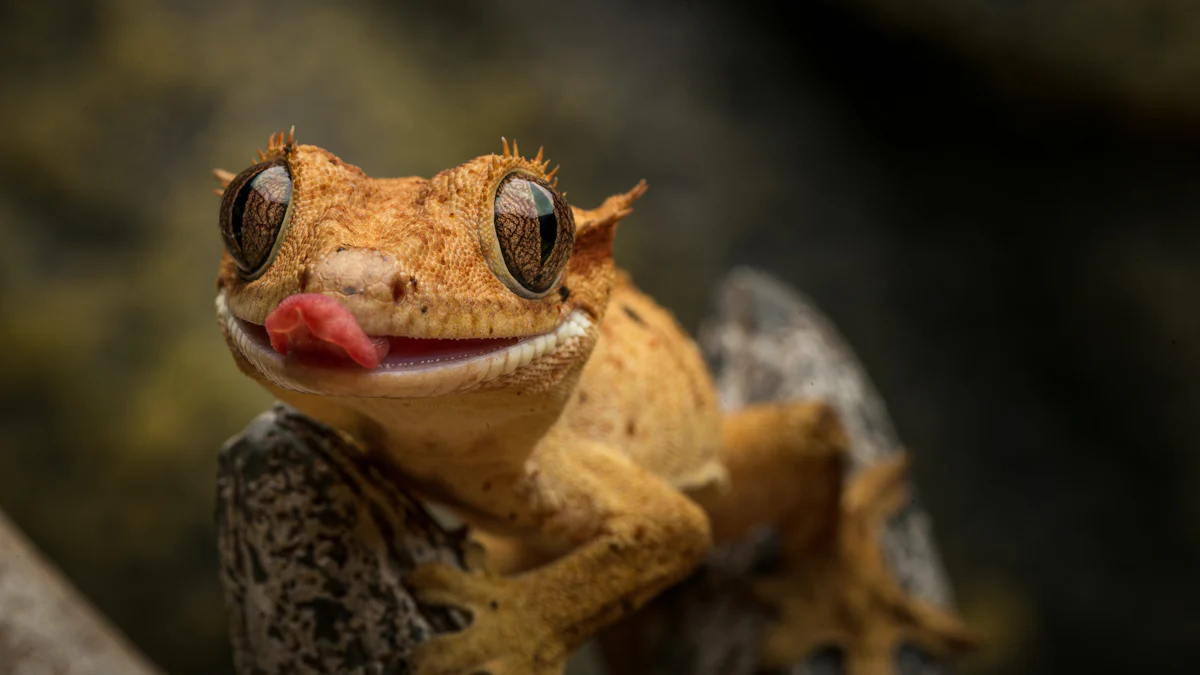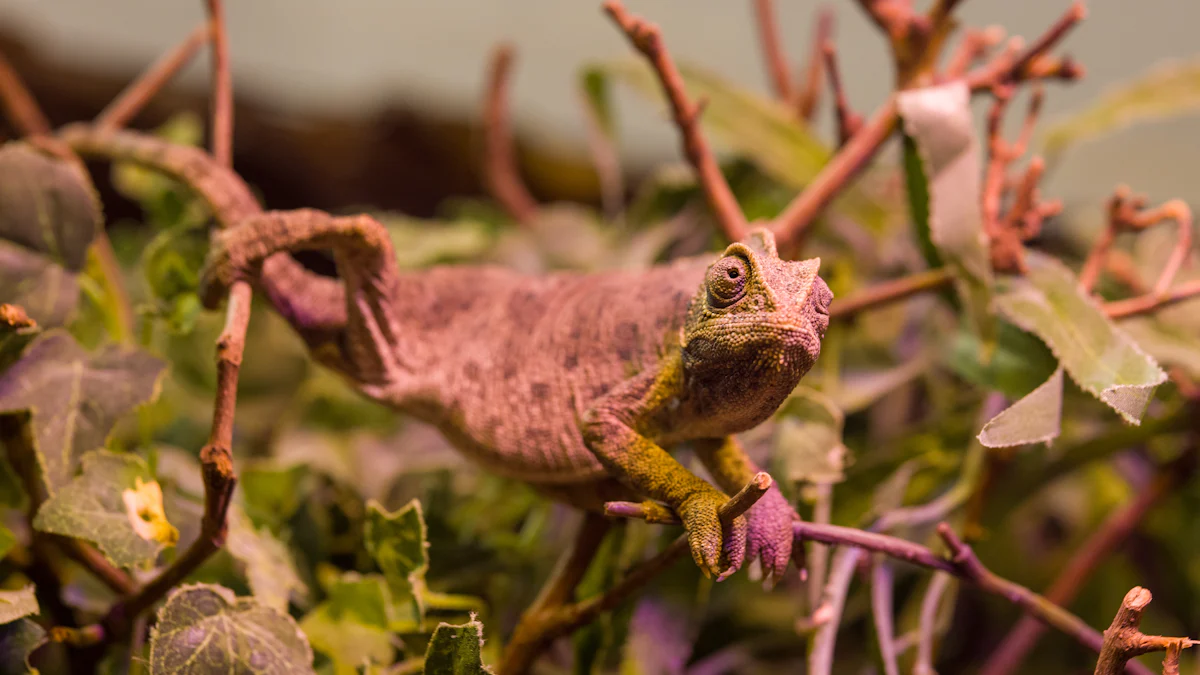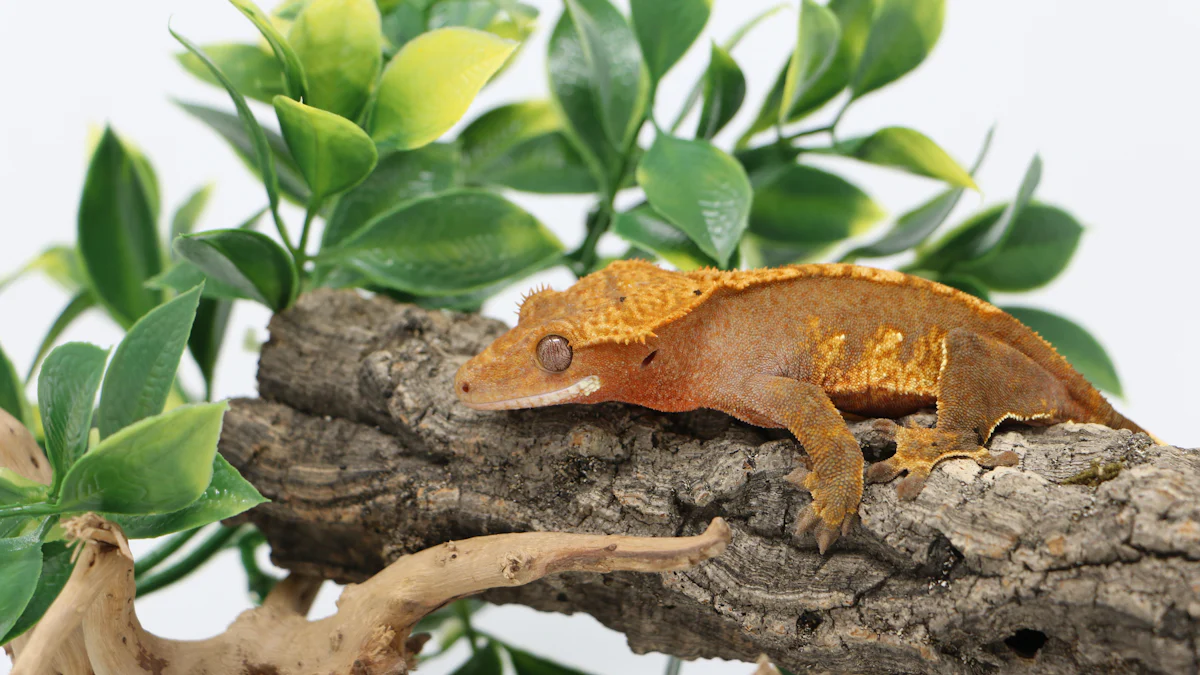
Crested geckos, known for their unique appearance and friendly demeanor, have become popular pets. Their dietary needs are crucial for their health and well-being. Crested gecko mealworms can be a nutritious part of their diet, offering protein and fat. However, moderation is key. In the wild, crested geckos consume a variety of foods, including fruits and insects. Mealworms differ from their natural diet, so they should be an occasional treat. A balanced diet includes commercial crested gecko food and fruit purees. Feeding crested gecko mealworms once or twice a month ensures a healthy and happy gecko.
Key Takeaways
- Crested geckos can eat mealworms, but they should be offered in moderation—ideally once or twice a month—to prevent health issues.
- Mealworms are a good source of protein and fat, but excessive fat intake can lead to obesity; balance their diet with fruits and commercial gecko food.
- Always choose mealworms that are appropriately sized—no larger than the space between the gecko’s eyes—to reduce the risk of choking or digestive problems.
- Gut-loading mealworms with nutrient-rich foods before feeding enhances their nutritional value, making them a healthier treat for your gecko.
- Dusting mealworms with calcium and vitamin D3 supplements is essential for supporting your gecko’s bone health and preventing deficiencies.
- Regularly monitor your gecko’s health and adjust their diet as needed, especially if you notice any signs of digestive distress after feeding mealworms.
- Purchase mealworms from reputable sources and store them properly to maintain their freshness and nutritional quality.
Nutritional Value and Safety of Crested Gecko Mealworms

Crested geckos, with their captivating appearance and gentle nature, have captured the hearts of many pet enthusiasts. Understanding their dietary needs is essential for ensuring their health and vitality. Crested gecko mealworms can play a role in their diet, offering both nutritional benefits and potential risks.
Nutritional Benefits
Protein Content
Mealworms provide a significant source of protein, which is vital for the growth and repair of tissues in crested geckos. Protein supports muscle development and overall health. Including mealworms in their diet can help meet these protein requirements, contributing to a robust and active gecko.
Fat Content
In addition to protein, mealworms contain fat, which serves as an energy source. While fat is necessary for energy, it is crucial to monitor its intake. Excessive fat can lead to obesity and other health issues. Therefore, mealworms should be offered sparingly to maintain a balanced diet.
Potential Risks
Risk of Impaction
One concern with feeding crested gecko mealworms is the risk of impaction. Mealworms have a hard exoskeleton made of chitin, which can be difficult for geckos to digest. This can lead to blockages in their digestive system. To minimize this risk, ensure mealworms are appropriately sized and not the primary food source.
Digestibility Concerns
Digestibility is another factor to consider. Some crested geckos may struggle to break down mealworms effectively. Observing your gecko’s response to mealworms is essential. If any signs of digestive distress appear, adjust their diet accordingly. A varied diet that includes fruits and commercial crested gecko food can help maintain digestive health.
By understanding the nutritional value and potential risks of crested gecko mealworms, pet owners can make informed decisions about their gecko’s diet. Offering mealworms in moderation, alongside other nutritious foods, ensures a balanced and healthy diet for these delightful creatures.
Feeding Instructions for Crested Gecko Mealworms
Crested geckos, with their charming personalities and striking looks, have become beloved pets. Their diet plays a pivotal role in maintaining their health and vitality. While crested gecko mealworms can be a part of their diet, understanding the appropriate size, quantity, and feeding frequency is essential to ensure their well-being.
Appropriate Size and Quantity
Size of Mealworms
Selecting the right size of mealworms is crucial for crested geckos. Mealworms should be small enough for the gecko to handle easily. A general rule of thumb is to choose mealworms that are no larger than the space between the gecko’s eyes. This ensures that the gecko can consume them without difficulty, reducing the risk of choking or digestive issues.
Recommended Quantity
Moderation is key when feeding mealworms to crested geckos. Offering too many can lead to an unbalanced diet and potential health problems. Experts recommend providing only a few mealworms at a time, typically around two to three per feeding session. This limited quantity helps maintain a balanced diet and prevents overconsumption of fat and protein.
Frequency of Feeding
How Often to Feed
Crested geckos should not rely on mealworms as a primary food source. Instead, mealworms should serve as an occasional treat. Feeding mealworms once or twice a month is generally sufficient. This frequency allows geckos to enjoy the nutritional benefits of mealworms without the risks associated with overfeeding.
Balancing with Other Foods
A balanced diet for crested geckos includes a variety of foods. In addition to mealworms, their diet should consist of commercial crested gecko food and fruit purees. These foods provide essential nutrients that mealworms alone cannot offer. By incorporating a diverse range of foods, pet owners can ensure their geckos receive a well-rounded diet that supports their overall health.
Expert Testimony:
Mariah Healey, a reptile husbandry specialist, advises caution with mealworms. She notes that they can be “potentially difficult to digest for cresties, leading to impaction in some cases.” This highlights the importance of moderation and careful observation when including mealworms in a crested gecko’s diet.
By following these feeding instructions, pet owners can provide their crested geckos with a nutritious and enjoyable diet. Understanding the appropriate size, quantity, and frequency of mealworm feedings ensures that these delightful creatures remain healthy and happy.
Preparing Crested Gecko Mealworms for Feeding

Crested geckos, with their vibrant colors and gentle nature, have become a favorite among reptile enthusiasts. Their diet requires careful consideration to ensure they receive the necessary nutrients. Preparing crested gecko mealworms properly enhances their nutritional value and ensures safe consumption.
Gut-Loading Mealworms
Importance of Gut-Loading
Gut-loading involves feeding mealworms nutrient-rich foods before offering them to crested geckos. This process significantly boosts the nutritional content of the mealworms, making them more beneficial for the geckos. By gut-loading, pet owners can ensure that their geckos receive essential vitamins and minerals that support their health and vitality.
How to Gut-Load
To gut-load mealworms effectively, provide them with foods rich in nutrients. Excellent choices include carrots, leafy greens, and commercial gut-loading products. These foods enhance the mealworms’ nutritional profile, making them a valuable addition to the gecko’s diet. Allow the mealworms to consume these foods for at least 24 hours before feeding them to your gecko. This preparation ensures that the mealworms are packed with nutrients, ready to nourish your pet.
Dusting with Supplements
Types of Supplements
Dusting mealworms with supplements is crucial for providing crested geckos with the vitamins and minerals they need. Calcium and vitamin D3 are essential supplements that support bone health and overall well-being. These supplements help prevent deficiencies that could lead to health issues in geckos.
Dusting Techniques
To dust mealworms, place them in a container with a small amount of supplement powder. Gently shake the container to coat the mealworms evenly. This technique ensures that each mealworm carries the necessary nutrients when consumed by the gecko. Regular dusting, combined with gut-loading, provides a balanced diet that supports the gecko’s health.
By preparing crested gecko mealworms through gut-loading and dusting, pet owners can offer a nutritious and safe treat. These practices enhance the mealworms’ nutritional value, ensuring that crested geckos receive the essential nutrients they need to thrive.
Buying and Storing Crested Gecko Mealworms
Crested geckos, with their captivating charm, have become a favorite among pet enthusiasts. Their diet requires careful consideration, especially when incorporating mealworms. Knowing where to buy and how to store these mealworms ensures they remain nutritious and safe for your gecko.
Where to Buy
Reputable Sources
Purchasing mealworms from reputable sources guarantees quality and safety. Pet stores specializing in reptiles often provide high-quality mealworms. These stores understand the dietary needs of crested geckos and ensure their mealworms are healthy and well-fed. Additionally, some breeders offer mealworms, providing another reliable option for pet owners.
Online vs. Local Stores
Both online and local stores offer mealworms, each with its advantages. Online stores provide convenience and a wide selection, allowing pet owners to compare prices and reviews easily. However, shipping times may vary, and there is a risk of receiving unhealthy mealworms. Local stores offer the benefit of immediate purchase and the ability to inspect the mealworms before buying. This hands-on approach ensures you select the best mealworms for your crested gecko.
Proper Storage
Storage Conditions
Proper storage of mealworms maintains their nutritional value and longevity. Keep mealworms in a well-ventilated container filled halfway with oats or bran. This substrate provides food and allows mealworms to burrow, mimicking their natural environment. Store the container in a cool, dark place, away from direct sunlight, to preserve their freshness.
Shelf Life
Regularly inspect mealworms for signs of spoilage, such as mold or dead worms. Remove any decaying specimens promptly to prevent contamination. For longer shelf life, consider refrigerating mealworms. This slows their metabolism and extends their lifespan, ensuring they remain a viable food source for your crested gecko. However, remember to take them out twice a week for 24-48 hours to gut-load them with nutritious foods like diced potatoes.
By purchasing from reputable sources and storing mealworms correctly, pet owners can provide their crested geckos with a nutritious and safe diet. These practices ensure that mealworms remain a valuable addition to the gecko’s dietary regimen, supporting their health and vitality.
Crested gecko mealworms can enrich a gecko’s diet when fed correctly. They offer protein and nutritional benefits, but moderation is crucial. Mealworms should be gut-loaded and dusted with supplements to enhance their nutritional value. This preparation ensures that geckos receive balanced nutrition. Regular monitoring of your gecko’s health is essential. Adjust feeding practices as needed to maintain their well-being. By incorporating mealworms as an occasional treat, alongside a varied diet, pet owners can support the optimal growth and development of their crested geckos.
FAQ
Can crested geckos eat mealworms?
Crested geckos can indeed eat mealworms. However, it’s essential to offer them as part of a balanced diet. Mealworms provide protein and some nutritional benefits, but moderation is crucial. Overfeeding can lead to health issues.
Are mealworms good for crested geckos?
Mealworms can be beneficial for crested geckos when given in moderation. They are high in protein, which supports growth and tissue repair. However, they also contain high fat levels and a hard exoskeleton made of chitin, which can cause digestive issues like impaction.
How often should mealworms be fed to crested geckos?
Feeding mealworms to crested geckos should be done sparingly. Offer mealworms as part of a varied diet, including other feeder insects and fruits. Typically, feeding mealworms 2-3 times a week is sufficient. For adult geckos, around 3-5 mealworms per feeding is recommended.
What precautions should be taken when feeding crested geckos mealworms?
When feeding mealworms to crested geckos, take precautions to avoid digestive problems. Some geckos may find mealworms difficult to digest, leading to impaction. Ensure mealworms are appropriately sized and not the primary food source. Observing your gecko’s response is vital.
Can mealworms be the sole food source for crested geckos?
Mealworms should not be the sole food source for crested geckos. A varied diet is crucial to ensure they receive all necessary nutrients. Consider dusting mealworms with calcium supplements and offering other feeder insects like crickets and waxworms to diversify their diet.
What is the importance of moderation when feeding mealworms to crested geckos?
Moderation is key when feeding mealworms to crested geckos. While they provide protein and other nutrients, relying solely on mealworms can lead to nutritional deficiencies. A balanced diet should include fruits and commercial crested gecko food to ensure overall health.
Expert Insight:
Mariah Healey, a reptile husbandry specialist, emphasizes the importance of moderation. She advises that mealworms can be “potentially difficult to digest for cresties, leading to impaction in some cases.” This highlights the need for careful observation and a balanced diet.


